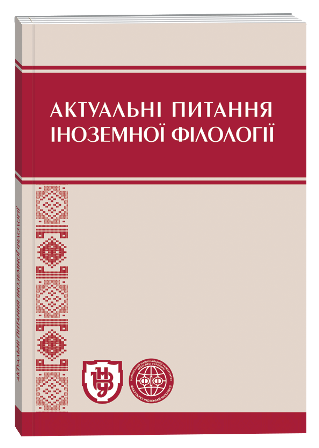STRATEGIES AND TACTICS OF THE WITNESSES IN THE PARLIAMENT OF GREAT BRITAIN AND IN THE US CONGRESS (COMPARATIVE ASPECT)
Keywords:
communicative strategy, communicative tactics, parliamentary discourse, addresseeAbstract
The article is devoted to the Witness – one of the participants in the English-language parliamentary discourse. The role of the Witness as the addressee in the witnesses questioning process is determined. The witnesses questioning process has three stages: the stage of contact setting, contact extension and unlocking. It was found that the activation of the speech activity of the Witnesses in the Parliament of the Great Britain and in the US Congress takes place at all stages of the communicative event. The definition of strategy and tactic is considered. An attempt is made to determine the communicative strategies and tactics of the Witness as an addressee in the witnesses questioning process during the committees' meeting. Comparison of strategic and tactical arsenal of Witnesses in the Parliament of the Great Britain and in the US Congress is made. Thus, the author concludes that the chosen cooperative strategy for speech communication is common to both Witnesses. Tactics of the cooperative strategy realization are common and different. 15 common tactics were identified: tactics of supposition, generalization, clarification, confirmation / consent, providing additional information, rhetorical question, reference / quoting, clarification / reciprocal, correction, fact, objection / disagreement, redirection, ignorance, self-presentation, promise. The tactic of the presentation is identified in the tactic arsenal of the Witness in the Parliament of Great Britain. For the cooperative strategy realization the Witness in the US Congress uses five more tactics, with the exception of the above-mentioned tactics common with the Witness in the Parliament of Great Britain, namely the tactic of reaction, request, own understanding, changing the topic focus, approval. The ranking of tactics, which are most often used by Witnesses for the cooperative strategy realization, is determined. Strategies and tactics of speech communication are embodied in speech acts that form discourses (texts) as units of communication. In turn, speech acts are realized by language (lexical, grammatical and stylistic) and non-native means.
References
Андрейчук Н. І. Семіотика лінгвокультурного простору Англії кінця XV – початку XVІІ століття : монографія / Н. І. Андрейчук. – Львів : Вид-во Львівської політехніки, 2011. – 280 с.
Андрусяк І. В. Лексика політичної коректності: номінативний та прагматичний аспекти / І. В. Андрусяк // Сучасні дослідження з іноземної філології : зб. наук. пр. – Ужгород : ТзОВ «Папірус-Ф», 2008. – Вип. 6. – С. 41–46.
Борисова И. Н. Дискурсивные стратегии в разговорном диалоге / И. Н. Борисова // Русская разговорная речь как явление городской культуры : сб. науч. трудов / отв. ред. Т. В. Матвеева. – Екатеринбург : АРГО, 1996. – С. 21–48.
Бутова І. С. Прагматико-функціональні особливості політичного дискурсу США та України ХХІ століття : автореф. дис. … канд. філол. наук : спец. 10.02.04 «Германські мови» / І. С. Бутова. – Львів, 2011. – 23 с.
Головань В. О. Модерація категоричності в парламентському дискурсі (на матеріалі засідань Європарламенту) : дис. ... канд. філол. наук : 10.02.04 / В. О. Головань. – Київ : Київ. нац. ун-т ім. Тараса Шевченка, 2016. – 222 с.
Демьянков В. З. Политический дискурс как предмет политологической филологии / В. З. Демьянков // Политическая наука. Политический дискурс: история и современные исследования. – М. : ИНИОН РАН, 2002. – № 3. – С. 32–43.
Донець П. М. Національно-культурна специфіка дискурсу / П. М. Донець // Дискурс як когнітиво-комунікативний феномен / під заг. ред Шевченко І. С. – Харків : Константа, 2005. – С. 198–232.
Иссерс О. С. Коммуникативные стратегии и тактики русской речи / О. С. Иссерс. – М. : Изд-во ЛКИ, 2012. – 304 с.
Карасик В. И. О типах дискурса / В. И. Карасик // Языковая личность: институциональный и персональный дискурс : сб. науч. тр. – Волгоград : Перемена, 2000. – С. 5–20.
Кривенко С. О. Автор політичного тексту та його роль у політичному дискурсі / С. О. Кривенко // Вісник Дніпропетровського університету. Серія : Філософія. Соціологія. Політологія. – 2015. – № 1. – С. 90–98. – [Електронний ресурс]. – Режим доступу : http://nbuv.gov.ua/UJRN/vdufsp_2015_1_15.
Кусько К. Я. Проблеми дискурсної лінгвістики / К. Я. Кусько // Іноземна філологія : укр. наук. зб. – Л. : ЛНУ, 2001. – 158 c.
Матвеева Т. В. Учебный словарь: русский язык, культура речи, стилистика, риторика / Т. В. Матвеева. – М. : Флинта: Наука, 2003. – С. 284–285.
Рябоконь Г. Л. Дискурсивні особливості інтернет-публікацій дебатів британського парламенту : дис. ... канд. філол. наук : 10.01.08 / Г. Л. Рябоконь. – Львів : Львів. нац. ун-т ім. І. Франка, 2005.– 276 с.
Селіванова О. О. Лінгвістична енциклопедія / О. О. Селіванова. – Полтава : Довкілля-К, 2011. – 844 с.
Сковородников А. П. О необходимости разграничения понятий «риторический прием», «стилистическая фигура», «речевая тактика», «речевой жанр» в практике терминологической лексикографии / А. П. Сковородников // Риторика↔Лингвистика : сб. науч. ст. – Смоленск : СГПУ, 2004. – Вып. 5. – С. 5–12.
Фоменко О. С. Лінгвістичний аналіз сучасного політичного дискурсу США (90-ті роки ХХ ст.) : автореф. дис. … канд. філол. наук : спец. 10.02.04 «Германські мови» / О. С. Фоменко. – К., 1998. – 18 с.
Яшенкова О. В. Основи теорії мовної комунікації / О. В. Яшенкова. – К. : Академія, 2010. – 309 с.
Downloads
Published
How to Cite
Issue
Section
License
Copyright (c) 2025 Леся Басюк

This work is licensed under a Creative Commons Attribution 4.0 International License.







